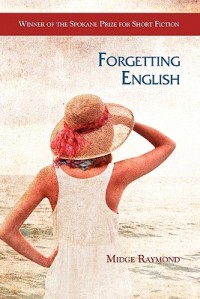 Yesterday, I reviewed a wonderful short story collection by Midge Raymond. Forgetting English features 10 stories with characters who are far from home and navigating an unfamiliar environment as they deal with crises and struggle to find themselves. Raymond’s ability to develop characters in just a handful of pages and to put readers right in the scene just blew me away. Seriously, before any of you tell me you don’t like short stories, I urge you to give this collection a try!
Yesterday, I reviewed a wonderful short story collection by Midge Raymond. Forgetting English features 10 stories with characters who are far from home and navigating an unfamiliar environment as they deal with crises and struggle to find themselves. Raymond’s ability to develop characters in just a handful of pages and to put readers right in the scene just blew me away. Seriously, before any of you tell me you don’t like short stories, I urge you to give this collection a try!
I invited Midge to Diary of an Eccentric to give me and my readers a glimpse of her writing space. I don’t know about you, but I love seeing where writers do their creating. I want to thank her for taking time out of her busy schedule to be here today. Please give a warm welcome to Midge Raymond.
A Space of One’s Own
I feel very fortunate to have a space of my own in which to write—mostly because this hasn’t always been the case. Over the years, my writing space has been both a corner of the living room and a corner of the bedroom. It was once a doorless room in a New York City railroad flat (more like a hallway, really, as it was the only way to get to both the kitchen and the bathroom). My writing space has also been, more recently, an actual room, with a door and windows. Always filled with books, it has also often been filled with office supplies, storage containers, and furniture that doesn’t fit anywhere else—but I have absolutely no complaints about that.
Of course, all writers who have partners, pets, and/or children, know that having a space of her own is never precisely that. Here’s a recent photo of my writing space, which represents a nearly everyday battle over the desk.
Moving around a lot and working in all sorts of odd places has taught me that I can write anywhere. And what it’s also taught me is that, although I now have a lovely writing studio to call my own, I actually still enjoy writing elsewhere. (I feel this way most often around the cat’s mealtime, when he parks himself on my papers or my keyboard.) There’s something about getting out of my usual space that helps me see a story a different way, and I find it so invigorating to get this new point of view. Whether it’s the library or a café or a park bench, the little things I see and the little bits of conversations I overhear often spark a new idea, or help me complete a thought.
And still, every time I return to my own space, I’m grateful. After the cat is fed and peace is restored, I feel lucky to be back in a room of my own. Yet I still find myself welcoming the interruptions. This is partly my tendency to procrastinate, I’ll admit; but it’s mostly because these little intrusions remind me that, like any good story, nothing in life should be too predictable.
 Thanks, Midge! It certainly looks like your cat owns the desk at the moment!
Thanks, Midge! It certainly looks like your cat owns the desk at the moment!
Midge has graciously offered a copy of Forgetting English to one of my readers. To enter, please leave a comment with your e-mail address and name the best short story or short story collection you’ve read so far. This giveaway is open to readers with U.S. addresses only and will close Sunday, July 10, 2011, at 11:59 pm EST. Good luck!
**Please note that this giveaway has ended**
Disclosure: I am an IndieBound affiliate and an Amazon associate.
© 2011 Anna Horner of Diary of an Eccentric. All Rights Reserved. Please do not reproduce or republish content without permission.
 I bought two books before I left — Tough Decisions: How a Good Manager Handles Being the Bad Guy and Broken Trust: Recovering from Infidelity. Not long before I learned about the reorganization, my husband had confessed that he was cheating on me. Unlike my bosses, at least Kyle convened his news in person, although he didn’t look me in the eye. I couldn’t fathom how I would restructure either my department or my marriage. In my desperation, I could only buy books.
I bought two books before I left — Tough Decisions: How a Good Manager Handles Being the Bad Guy and Broken Trust: Recovering from Infidelity. Not long before I learned about the reorganization, my husband had confessed that he was cheating on me. Unlike my bosses, at least Kyle convened his news in person, although he didn’t look me in the eye. I couldn’t fathom how I would restructure either my department or my marriage. In my desperation, I could only buy books.
